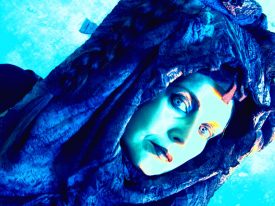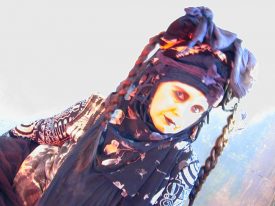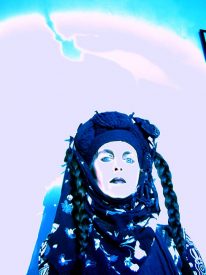
Music Distribution
We are currently experiencing some short-term hiccups with our physical CD distribution: in the meantime please click on the album links on our Albums page and hit the Amazon buying links to check if your title is available .
Download sales continue to be available via the usual services and you can also still stream our music as usual.

Music Distribution
We are currently experiencing some short-term hiccups with our physical CD distribution: in the meantime please click on the album links on our Albums page and hit the Amazon buying links to check if your title is available .
Download sales continue to be available via the usual services and you can also still stream our music as usual.
Lene Lovich in 2005
by Kurt Reighley
 Since Lene Lovich burst onto the scene with her 1979 hit single “Lucky Number,” ushering in the New Wave era, her life has been defined by an unyielding commitment to the arts and activism. She starred in the French television film Rock, costarred (with Nina Hagen and Herman Brood) in the motion picture Cha-Cha, and co-wrote and played the lead in the London stage play Mata Hari. She co-wrote the score to the short film Alpha Girls, and also wrote the libretto for the opera The Collector, and recorded Peter Hammill and Judge Smith’s opera Fall of the House of Usher. She recorded and toured in support of the fundraising single “Don’t Kill The Animals” with German star Nina Hagen. The Stereo Society, the on-line label founded in 1999 by celebrated producer Mike Thorne (Wire, Bronski Beat, John Cale), now proudly presents us with Lene’s greatly anticipated new album: Shadows and Dust.
Since Lene Lovich burst onto the scene with her 1979 hit single “Lucky Number,” ushering in the New Wave era, her life has been defined by an unyielding commitment to the arts and activism. She starred in the French television film Rock, costarred (with Nina Hagen and Herman Brood) in the motion picture Cha-Cha, and co-wrote and played the lead in the London stage play Mata Hari. She co-wrote the score to the short film Alpha Girls, and also wrote the libretto for the opera The Collector, and recorded Peter Hammill and Judge Smith’s opera Fall of the House of Usher. She recorded and toured in support of the fundraising single “Don’t Kill The Animals” with German star Nina Hagen. The Stereo Society, the on-line label founded in 1999 by celebrated producer Mike Thorne (Wire, Bronski Beat, John Cale), now proudly presents us with Lene’s greatly anticipated new album: Shadows and Dust.
Lene Lovich’s impact on pop music can hardly be understated. The influence of her arty, flamboyant new wave persona, assertive, banshee-howl-inflected vocals, and idiosyncratic songwriting style can be seen clearly in countless female artists, from peers like Siouxsie Sioux and Grace Jones, to those who have followed in her footsteps: Björk, PJ Harvey, Gwen Stefani, and Karen O. In her absence, it is nigh impossible to conceive of the modern landscape of alternative female pop artists. Lene has carved out a unique niche in the world, always while doggedly pursuing her own muse, her own passions. And only an artist as inventive as Lene can take such ephemeral materials as Shadows and Dust, and fashion them into a record as gripping as this, her fifth full-length.
Musically, Lene and her longtime collaborator, husband Les Chappell, continue to revel in invention and eccentricity. The ten-track set opens with “Ghost Story,” a mélange of beguiling chimes and digitized guitars, Lene’s mesmerizing ululations underpinned by dark, demonic bellowing. The Expressionist howl of “Sanctuary” soars on wings of percolating percussion and driving synthesizers, while “Shape Shifter,” a rumination on identity and mutual understanding, integrates see-sawing drum loops and subtle strings, punctuated by trumpet. While retaining the playful experimentation and striking pop sensibilities that imbued earlier Lovich albums, Shadows and Dust is also a more dense, complex, multi-layered affair, rife with surprises.
 “Almost all of the music was played by Les,” says Lene, “apart from some saxophone and trumpet, which I played. We also used a lot of vocal sounds, woven into the music, sometimes adding atmosphere, sometimes a melodic element.” Likewise, the sonorous qualities of language continues to shape her songwriting aesthetic. “I’ve always been keen to use a word that sounds right, rather than one with a particular meaning. Sometimes you want a word to attack, and other times it’s better if the rhythm is not interrupted. We have so many words to choose from, it’s not a problem.”
“Almost all of the music was played by Les,” says Lene, “apart from some saxophone and trumpet, which I played. We also used a lot of vocal sounds, woven into the music, sometimes adding atmosphere, sometimes a melodic element.” Likewise, the sonorous qualities of language continues to shape her songwriting aesthetic. “I’ve always been keen to use a word that sounds right, rather than one with a particular meaning. Sometimes you want a word to attack, and other times it’s better if the rhythm is not interrupted. We have so many words to choose from, it’s not a problem.”
Although the majority of the disc was written, recorded, and played by Lene and Les at their home in England, a few collaborations added to the magic of Shadows and Dust. Thorne played bass on a few tracks, and assisted with mixing and fine-tuning. The kinetic “Insect Eater,” the classic Dracula tale as told through the eyes of his deranged servant, Renfield, features lyrics courtesy of Heathcote Williams. “The Wicked Witch,” with its thunderous drums and slashing power chords, cackles and caterwauls, was born from working with the Berlin ensemble Latz.
“Initially, they asked for some vocal input from me on one of their tracks, but it turned into a real song, a goth-pop anthem,” says Lene. “Although I have to say, lest anyone gets offended, that this song is not about real pagan religion or the occult. It is a song about clichés and nasty fairy tales.”
 The album’s recurring supernatural themes reflects a lifelong fascination for Lene: “The weirdness and wonder of other worlds has been with me for a long time. It’s a great escape from disappointment, boredom, and real horror. Does anybody really know what color a monster is? There is a great deal of freedom in the world of the unusual.” In the words of her new song, “Gothica,” “Everybody needs a refuge from the ordinary.”
The album’s recurring supernatural themes reflects a lifelong fascination for Lene: “The weirdness and wonder of other worlds has been with me for a long time. It’s a great escape from disappointment, boredom, and real horror. Does anybody really know what color a monster is? There is a great deal of freedom in the world of the unusual.” In the words of her new song, “Gothica,” “Everybody needs a refuge from the ordinary.”
While Shadows and Dust is suffused with dark humor, Lene and Les do not treat their subject matter frivolously. “Everything I say in the songs has a personal connection. If I am suggesting that people take a particular action – or non-action – it’s with the understanding that I have wrestled with this problem in my personal life.” She cites “Sanctuary” as an example, highlighting the song’s anti-suicide message. “If I had killed myself every time I felt like it, I would have died a hundred times by now.”
 For almost thirty years, Lene Lovich has been gleefully defying conventions about how women in popular music should sound, act, and appear. (What else would you expect from a woman who once made a pilgrimage to meet Salvador Dali?) Prior to Shadows and Dust, Lovich released four albums – Stateless, Flex, No Man’s Land, and March – as well as the EP New Toy, featuring the titular club hit, written by then-band member Thomas Dolby. Her international hits and dance-floor favorites include “I Think We’re Alone Now,” “Say When,” “Lucky Number,” “Bird Song,” “New Toy,” and “It’s You, Only You (Mein Schmerz).”
For almost thirty years, Lene Lovich has been gleefully defying conventions about how women in popular music should sound, act, and appear. (What else would you expect from a woman who once made a pilgrimage to meet Salvador Dali?) Prior to Shadows and Dust, Lovich released four albums – Stateless, Flex, No Man’s Land, and March – as well as the EP New Toy, featuring the titular club hit, written by then-band member Thomas Dolby. Her international hits and dance-floor favorites include “I Think We’re Alone Now,” “Say When,” “Lucky Number,” “Bird Song,” “New Toy,” and “It’s You, Only You (Mein Schmerz).”
In addition to her musical and theatrical activities, and raising two daughters, Lene is also a leading advocate for animal rights, often on behalf of PETA (People for the Ethical Treatment of Animals). ‘There’s a constant need to make people aware of what’s happening to animals,’ she notes. ‘People do stupid things when they don’t know any better.’ In addition to cutting Don’t Kill The Animals with Hagen, she wrote and performed Rage with Erasure for the Tame Yourself benefit project, and received a Humanitarian Award from PETA in 1988.
